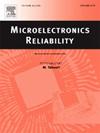An FPGA-based architecture for time-resolved polarization probing of FeRAM fatigue
IF 1.9
4区 工程技术
Q3 ENGINEERING, ELECTRICAL & ELECTRONIC
引用次数: 0
Abstract
Traditional approaches to assessing Ferroelectric RAM (FeRAM) reliability rely on direct electrical access to individual capacitors. While effective on isolated test structures, such methods are infeasible for high-density, packaged memory arrays, creating a critical gap between device-level physics and system-level reliability assessment. To bridge this gap, we propose Time-Resolved Polarization Probing (TRPP), a novel indirect methodology that infers the internal polarization state by precisely measuring the minimum switching time accessible at the cell terminals. We implement TRPP on a custom FPGA-based platform that integrates a flexible MBIST engine for controlled fatigue stressing with a carry-chain programmable delay generator offering 53 ps resolution. Experimental results on FeRAM devices demonstrate that TRPP effectively quantifies the progressive degradation of polarization kinetics under stress up to cycles. The measurements further reveal disproportionately severe degradation at lower operating voltages, underscoring critical implications for low-power and compute-in-memory applications. Overall, this work establishes TRPP as a high-resolution, scalable methodology for reliability characterization, bridging the gap between device physics and system-level deployment.
基于fpga的FeRAM疲劳时间分辨极化探测结构
评估铁电RAM (FeRAM)可靠性的传统方法依赖于对单个电容器的直接电访问。虽然这种方法在孤立的测试结构上是有效的,但对于高密度、封装的存储器阵列来说是不可行的,这在设备级物理和系统级可靠性评估之间造成了严重的差距。为了弥补这一差距,我们提出了时间分辨极化探测(TRPP),这是一种新的间接方法,通过精确测量细胞终端可访问的最小开关时间来推断内部极化状态。我们在一个定制的基于fpga的平台上实现TRPP,该平台集成了一个灵活的MBIST引擎,用于控制疲劳应力和提供53 ps分辨率的携带链可编程延迟发生器。在FeRAM设备上的实验结果表明,TRPP可以有效地量化在109次循环的应力下极化动力学的逐步退化。测量进一步揭示了在较低工作电压下不成比例的严重退化,强调了低功耗和内存计算应用的关键含义。总的来说,这项工作将TRPP确立为一种高分辨率、可扩展的可靠性表征方法,弥合了设备物理和系统级部署之间的差距。
本文章由计算机程序翻译,如有差异,请以英文原文为准。
求助全文
约1分钟内获得全文
求助全文
来源期刊

Microelectronics Reliability
工程技术-工程:电子与电气
CiteScore
3.30
自引率
12.50%
发文量
342
审稿时长
68 days
期刊介绍:
Microelectronics Reliability, is dedicated to disseminating the latest research results and related information on the reliability of microelectronic devices, circuits and systems, from materials, process and manufacturing, to design, testing and operation. The coverage of the journal includes the following topics: measurement, understanding and analysis; evaluation and prediction; modelling and simulation; methodologies and mitigation. Papers which combine reliability with other important areas of microelectronics engineering, such as design, fabrication, integration, testing, and field operation will also be welcome, and practical papers reporting case studies in the field and specific application domains are particularly encouraged.
Most accepted papers will be published as Research Papers, describing significant advances and completed work. Papers reviewing important developing topics of general interest may be accepted for publication as Review Papers. Urgent communications of a more preliminary nature and short reports on completed practical work of current interest may be considered for publication as Research Notes. All contributions are subject to peer review by leading experts in the field.
 求助内容:
求助内容: 应助结果提醒方式:
应助结果提醒方式:


